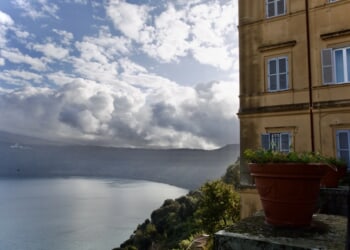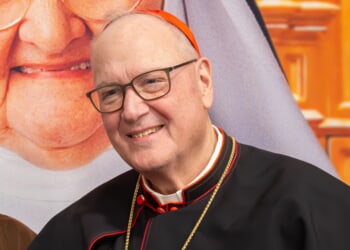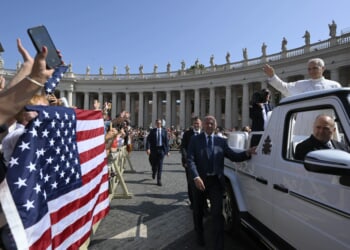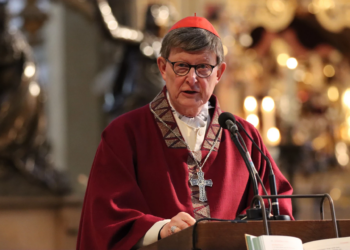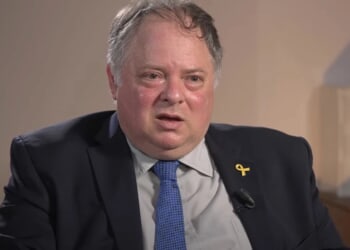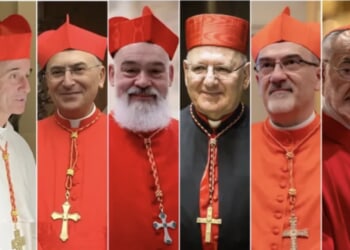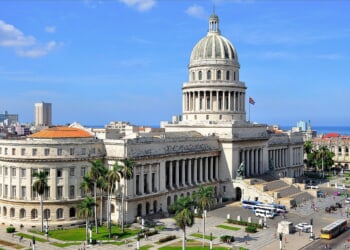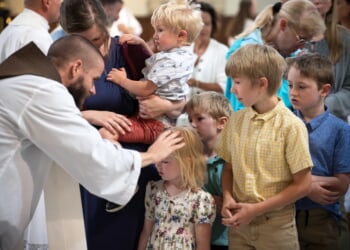ACI MENA, May 5, 2025 /
17:12 pm
As the College of Cardinals prepares to gather in the conclave, the global Church enters a moment of discernment — and of speculation. Behind closed doors, names are floated, alliances weighed, and expectations quietly shaped. Some hope for a return to an Italian pope, others call for a voice from the peripheries. Many, amid the noise, turn to prayer, trusting the Holy Spirit’s guidance.
For Christians in the Middle East, this moment carries particular significance. These ancient communities, rooted in lands marked by instability and loss, have not seen a pope from their region since the seventh century. And yet their presence endures — reduced in number but not in faith; marginalized politically, yet vital to the universal Church.
Pope Francis, the first pontiff from Latin America, offered Middle Eastern Christians exceptional attention. Through his pastoral visits, his calls for peace, and his engagement with Muslim and Orthodox leaders, he gave voice to communities too often forgotten. His death leaves a void not only in Rome but also in Baghdad, Beirut, Jerusalem, and beyond.
As the Church prepares to choose his successor, many in the region are asking: Will the next pope understand their wounds, their witness, and their hope?
Here is what some Middle Eastern Christians say they are seeking from the next bishop of Rome.
Lebanese seminarian: ‘Not left or right, but rooted in Christ’
Jason El Akoury, a young seminarian in his fifth year at the Maronite Patriarchal Seminary in Ghazir, Lebanon, serving the Maronite Patriarchal Eparchy of Jounieh, spoke to ACI MENA, CNA’s Arabic-language news partner, about his hopes for the next pope. “I pray the next pope will be a living icon of Christ,” he said, “someone whose love for the Lord is so sincere and visible that it draws others to holiness.”
Now in his second year of theology and already ordained a lector, El Akoury reflected on St. Paul’s invitation: “Imitate me as I imitate Christ” and shared his longing for a pontiff whose personal witness invites the world into deeper discipleship.
“I envision a shepherd who combines the charismatic presence of St. John Paul II, the theological depth of Pope Benedict XVI, and the pastoral closeness of Pope Francis. I pray he will be a unifying figure in a divided and lost world, firm in truth yet gentle in mercy, capable of engaging with the questions and concerns of today’s youth.”
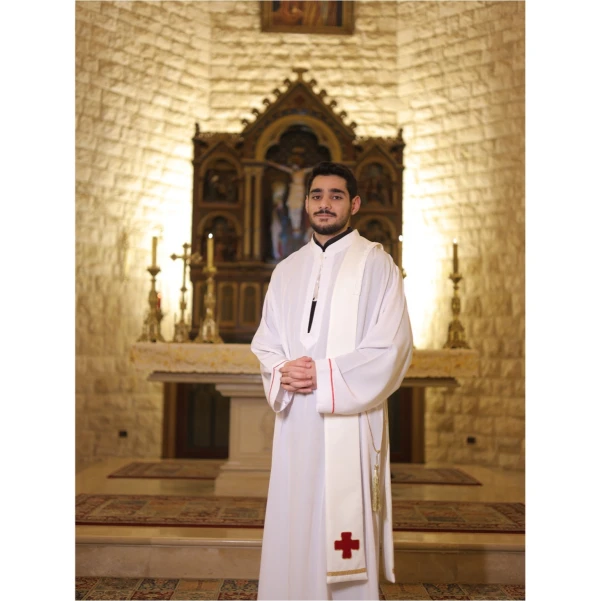
He also expressed a deep ecumenical hope.
“I pray he will continue the Church’s commitment to healing the wound of the Great Schism, working toward a renewed koinonia — a true communion — with the Orthodox churches, in response to Christ’s prayer ‘that they may all be one, as you, Father, are in me and I in you,’” he said.
He continued: “When the world sees us, Christians, loving one another, then we will be known as true disciples of Christ.”
El Akoury cautioned against reducing the conclave to a mere political contest. “Viewing this election through the lens of human categories — traditionalist versus progressive, conservative versus liberal — is foolishness,” he said.
“It’s true that the next pope must respond to the challenges of our time, and this may require specific actions. But extremism, in any direction, has never been the solution. Ultimately, the pope is the fruit of the synergy between the will of the cardinals and the will of God. The better the harmony, the better the pope will be. Rather than worry about what we cannot control, we ought to pray that each cardinal’s heart is open to the voice of the Holy Spirit.”
Like many in Lebanon, he also expressed disappointment that Pope Francis was never able to visit the country. “I see the visit of the pontiff as an encouragement for the people to live their faith and know its beauty especially, especially in nations devastated by war, corruption, or neglect,” he said.
(Story continues below)
Subscribe to our daily newsletter
When it comes to the Eastern Catholic liturgical heritage, El Akoury said he hopes the next pope will not only respect but also actively promote its flourishing. “I would express my hope that he continues the path set by the Second Vatican Council, which affirmed the freedom and dignity of the Eastern Catholic Churches to preserve and fully live their own liturgical traditions,” he said.
“I would humbly suggest that he support efforts to protect these traditions from external pressures or Latinization and to encourage our synods and patriarchs in revitalizing liturgical life — through authentic catechesis, renewal, and the promotion of original languages and music.”
Iraqi Christian wants a pope who will not forget the suffering Church
That same desire for a holy and accessible shepherd was echoed by Saveen Soran Youssef, a 27-year-old Chaldean Catholic from Erbil, Iraq.
A member of the choir at St. Joseph Cathedral and former host on Radio Mariam Iraq, Youssef told ACI MENA that she isn’t concerned about where the next pope comes from.
“The next pope — regardless of his ethnic or geographical background — will be the right person in the right place. I trust that the Church, through the Holy Spirit, will choose the most suitable and faithful shepherd.”
“As a citizen of the Middle East, I live in a wounded country that has suffered for a long time,” she said. “My people have faced countless challenges — wars, persecutions, massacres — as well as blockade and poverty.”
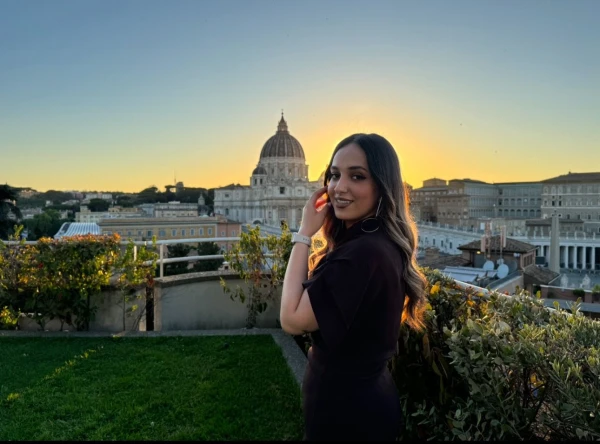
As a Chaldean Catholic, Youssef speaks from a place of both history and hardship. “I belong to Mesopotamia, the land of civilizations, history, and culture. My community has always lived as a minority, facing all the hardships mentioned above. We have thousands of martyrs for Christ and thousands of displaced people.”
Youssef continued: “Despite all these persecutions and challenges, the true shepherds of our Church have not hesitated to give even their lives for their faith — among them the Blessed Father Ragheed Ganni, whose canonization we await with pride and honor.”
It was in this context that Pope Francis’ historic visit to Iraq in 2021 took on such profound meaning.
“It came at a very difficult time, during the COVID-19 pandemic, and brought with it hope and joy to all Iraqis in general, and to Christians in particular,” she recalled. “It was a visit in which the pope challenged dangers — a balm for bleeding wounds.” The motto of the trip, “You are all brothers,” was, for Youssef, more than a diplomatic gesture. “It was a clear symbol of peace, love, and fraternity — a slogan that fully reflected the message of Christ.”
But for Iraq’s Christians, the message was also a warning.
“Pope Francis’ visit shone a light on the ancient Christian presence, which is sadly under threat of extinction. This is the greatest challenge we face today — our fear of one day vanishing from this land we consider our ancestral home.”
That’s why, she added, the next pope must not forget Iraq. “We hope he will continue the mission of Pope Francis, who said: ‘I will always carry Iraq in my heart.’”
A priest’s message from Damascus
From Damascus, Father Antonius Raafat Abou Al-Nasr, general chaplain of the Melkite Catholic Youth in Syria and head of the Office of the Melkite Greek Catholic Archeparchy of Damascus and Its Countryside, offered a sobering reminder of the suffering Syrian Christians continue to endure.
“The Syrian crisis is one of the most severe ordeals the Middle East has faced in modern times,” he said. “The Catholic Church, represented by the Vatican, has consistently expressed its solidarity with the people of Syria — especially the Christians living under the weight of war and destruction. But does the Vatican truly grasp the depth of the Syrian crisis from a pastoral and spiritual perspective?”
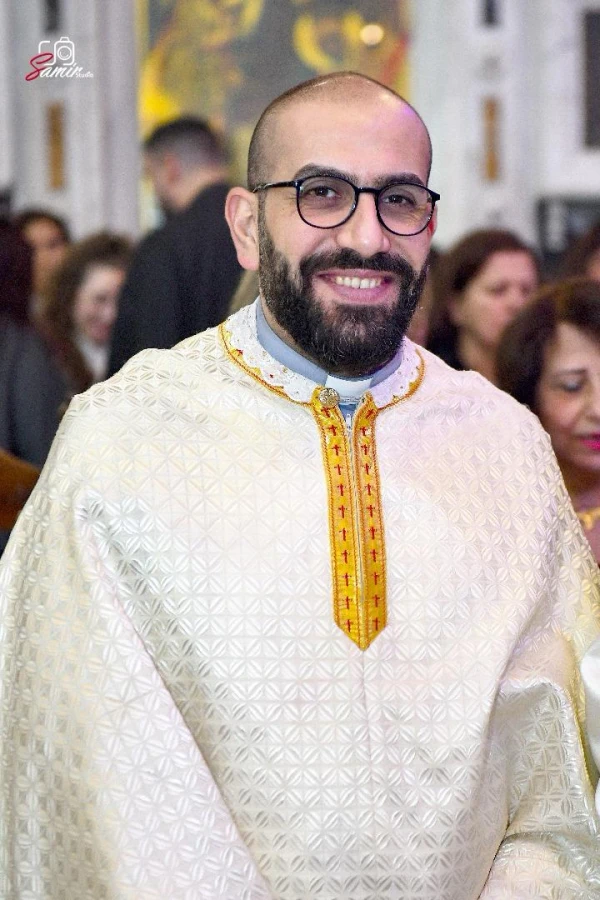
If he could speak to the next pope directly, his message would be clear: “You, as a spiritual father and a shepherd to the world, have a vital role in conveying the voice of Syrian suffering to every corner of the earth. We are living under the rubble of wars, where hope and normal life are fading. We need your spiritual support above all else. We long to see in you the image of the Father who does not forget his children in their time of trial.”
Abou Al-Nasr also addressed the broader debate on whether the Church needs a pope from outside Europe.
“The world is moving toward greater cultural and religious diversity,” he said. “The pope must reflect that diversity and stand close to marginalized communities — in Asia, Africa, Latin America, and the Middle East.”
More than geography, however, Abou Al-Nasr emphasized heart and courage. “I don’t wish for the next pope to simply represent a region. I hope he has an open heart and deep compassion for people in crisis.”
“In times of escalating crisis,” he added, “the pope’s spiritual role matters more than ever.
“Our hope is that the next pope will be a voice for peace and mercy — and remain close to our people, who are still searching for stability and reassurance,” he said.
Gaza-born analyst hopes for moral clarity and concrete action
The longing for a pope who speaks with moral clarity was echoed by Khalil Sayegh, a Palestinian Christian political analyst born in Gaza. For Sayegh, Pope Francis set a powerful precedent. “Francis showed us what pastoral leadership looks like when your people are going through a very difficult time,” he told ACI MENA.
For Sayegh, leadership also means action. “We need more concrete steps to support the Christian community in Gaza and across Palestine — especially around property rights and land confiscations…Church properties are tied to the livelihood and survival of the Christian community in the future.”
While he acknowledged the power of papal statements, he insisted Francis went further. “His care, his calls, his love — that went beyond statements. And that matters,” he said.
He described Francis as a moral compass in a time of collapse. “There’s something powerful about how he called things by their names, at a moment when this whole liberal order and the claims of international law are collapsing before our eyes.”
Sayegh said he believes a papal visit to Palestine would send a message that cannot be ignored. “It would be powerful for the next pope to come here and speak clearly: that there must be an end to the occupation, that there must be peace between Israelis and Palestinians, and that no one is leaving this land. A visit would show real solidarity beyond statements.”
While he hasn’t formed a preference among the likely candidates, Sayegh spoke with admiration of Cardinal Pierbattista Pizzaballa, the Latin patriarch of Jerusalem. “I personally met him several times. He knows this reality firsthand. He speaks Arabic and Hebrew. He shepherded the Church in Jerusalem with courage, and he came to Gaza during the war — while the genocide was still unfolding — without security. That’s what Christlike leadership looks like.”
He also recalled Pizzaballa’s extraordinary offer in the early days of the war: “When Hamas kidnapped Israeli hostages, he said they could take him instead and release them. That was a powerful demonstration of love.”
Still, Sayegh emphasized that the Church is universal. “Of course I’d like the next pope to care about Palestine, and someone like Pizzaballa would ensure our voice is heard. But the Church is much bigger than just Palestine. The pope has to also speak to other urgent challenges — young people leaving the Church, the clash between faith and secularism, etc.”
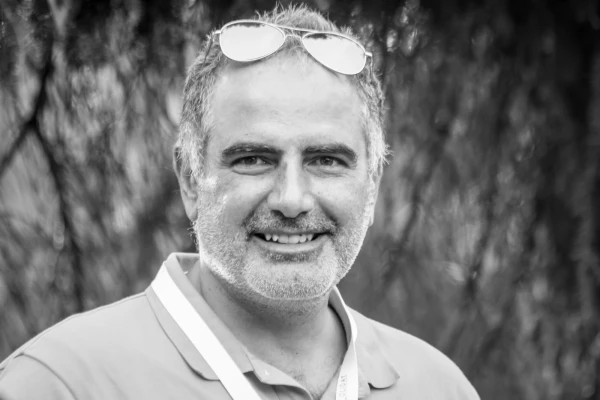
An Orthodox scholar’s appeal: unity through tradition
The question of unity also emerged in the reflections of Dr. Tony Nasrallah, an Orthodox Christian and adjunct associate professor of architecture, history, and ethics at the Lebanese American University. A published scholar with a doctorate in history, Nasrallah approaches the papacy from the outside but with deep theological interest and ecumenical hope.
“What I would hope,” he told ACI MENA, “is that the next pope be, above all, a man of deep prayer — one who listens to the Lord and is therefore prophetic.”
For Nasrallah, the vision of the pope must go beyond internal Catholic concerns. “I would also hope that he finds Christ not only in the Eucharist but also in other churches, including the Eastern Orthodox. Such a vision, I pray, would arise not merely from obligation but from personal experience and conviction.”
When asked what steps the next pope could take toward unity between the Catholic and Orthodox churches, his answer was both concrete and theological. “I would like to see the next pope commit sincerely to a path of humility, dialogue, and mutual recognition,” he said.
“I do not think I would be asking too much if he would consider the Catholic Church as one patriarchate — with its own laws and traditions — standing side by side with the rest of the Eastern Orthodox patriarchates — in love and in fraternal equality.”
Looking back on the Francis pontificate, Nasrallah offered a contemplative analogy. “The seventh-century monk Dorotheos of Gaza wrote that if dots on the circumference of a circle move closer to the center, they also move closer to one another. If the center is Christ, then moving closer to him means that we are moving closer to each other.”
“I believe that when Christian prelates go to the center of their tradition, they are moving toward Christ,” he added.
If he had one message to share with the next pope, it would be this: “It was Cardinal Robert Sarah who said, ‘The West has denied its Christian roots. A tree without roots dies.’ A West that is rooted in Christ is the best reward the Orthodox Church could have from her sister.”
This story was first published by ACI MENA, CNA’s Arabic-language news partner, and has been translated and adapted by CNA.






